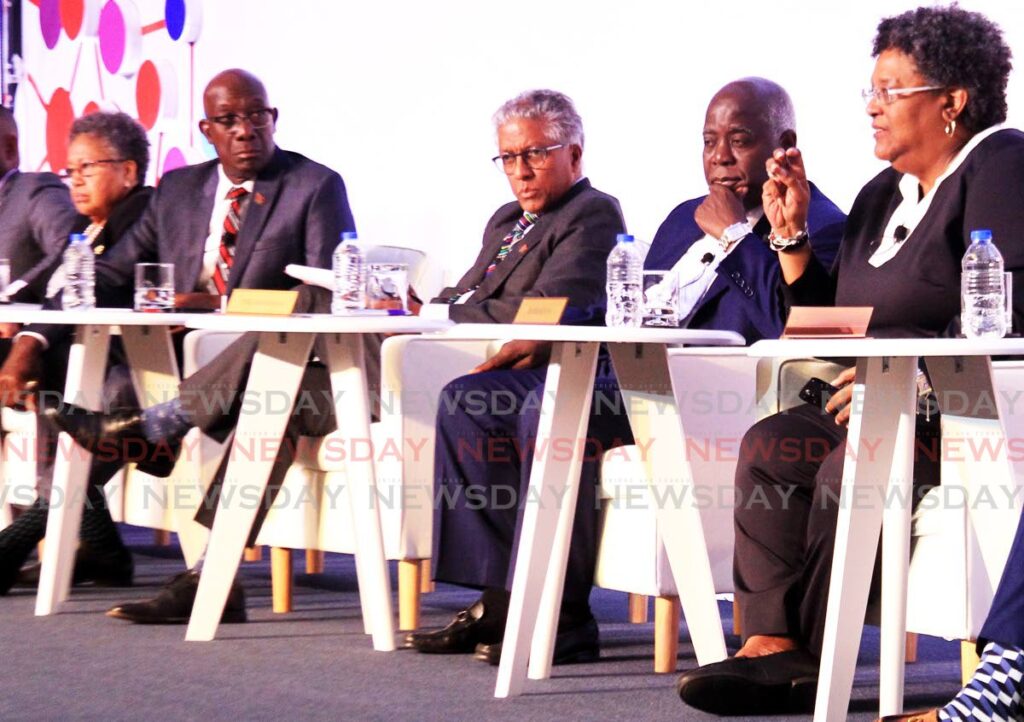Law knocked at Caricom crime talks – LEADERS HIT BAIL FOR MURDER

HEADS OF STATE gathered for the Caricom symposium on crime as a public health issue at the Hyatt Regency in Port of Spain knocked the trend of judges and magistrates granting bail to people arrested and charged for murder.
Barbados Prime Minister Mia Mottley recalled that in her time as a lawyer, this was something that just wasn’t done.
“(We have) jurisprudential developments that have affectively led to people getting bail for murders…” she said. “When I practised law, nobody got bail for murder!
“When I look at the stats, not just in The Bahamas, the people who are causing the most trouble are charged with two, three and four murders. Something is fundamentally wrong with that.
"So I ask myself, how are we going to deconstruct and reconstruct to meet the reality of this jurisprudential development which is undermining the rule of law in our countries?”
Clayton Fernandes, commissioner of police in The Bahamas, said while murders increased from 119 in 2021 to 128 in 2022, for the first quarter of this year, there have been 35 murders, ten fewer than for the same period last year. He also pointed out that The Bahamas had a 69 per cent solve rate and that 34 out of the people held for murder were out on bail for previous murders.
“You wouldn’t see this detection rate anywhere else in the world, but we want to prevent these matters from happening,” he said.
St Vincent and the Grenadines Prime Minister Ralph Gonsalves also knocked this law.
“There is in aspects of our judiciary a creeping lack of awareness as to some of the problems we face,” he said. “How can you go and give bail to someone charged for murder? Let’s be serious! I saw the numbers from The Bahamas. Where do those judges live, Mars?”
Trinidad and Tobago, which is hosting the two-day symposium, saw fundamental changes to its laws last year which paved the way to give people charged with murder the legal right to petition a judge for bail.
In July, the Privy Council dismissed an appeal by the Attorney General to withhold bail for murder.
The local Appeal Court ruled that section 5 (1) of the Bail Act of 1994 – which stopped judicial officers from considering bail for those accused of murder – was unconstitutional and was not saved law.
The State went to the Privy Council to appeal the local appellate court's ruling but lost.
Government has also failed to convince the Opposition to support the proposed bail amendment bill, which would deny bail for certain offences including gun-charges and murder. The bill requires a three-fifths majority.
The Prime Minister, speaking on jurisprudence, also knocked the trend in TT where the identities of people suspected of murder are protected and not publicised by police to solicit help or information from the public.
“The Jamaican experience has told us that some interventions have brought success. One of those interventions is putting up to the public the picture and the name of a perpetrator wanted for assistance with a crime,” Rowley said.
“That has not happened in TT for some time. Because somewhere along the way, enlightened voices have said to the country, through the law fraternity, that it is an abuse of a person’s right to privacy to have that person’s picture on television wanted by the police for murder.”
Caricom heads of state also took the US to task, saying it was not doing enough to stem the deluge of illegal firearms coming into the region and into the hands of criminals.
There was agreement for stronger lobbying for more US assistance in reducing the number of illegal guns coming into the region.
“Just as we assisted them in the war on drugs, they must assist us in the war on guns,” said Jamaican Prime Minister Andrew Holness.
“Collectivel, as leaders of Caricom, we must raise our voices on this. We must appeal to our friends in the North to prevent the flow of guns in the region.”
Bajan PM Mottley said the US had no moral authority to speak on violence in the region. “You cannot separate violence from climate from pandemic from all these other things,” she said.
“They are development issues; and regrettably behaviour coming from outside our region is crowding out our ability to spend money on the development of our people.”
Mottley called for an action plan to be completed by the end of the two-day symposium.
She called for a Caricom arrest warrant; rotation of judges among the various islands to reduce familiarities between them and lawyers; an enlargement in the jurisdiction of magistrates; co-operation in forensics; and a deconstruction and reconstruction of the region’s police service to ensure better communications between security forces in the region.
“I do believe we will do ourselves an injustice,” she said. “Yes, Keith, it is called a symposium, but we need to leave Port of Spain with decisions. And there is no reason why we can’t, because you are the lead prime minister on security,” Mottley pointed out as Dr Rowley listened intently.

Comments
"Law knocked at Caricom crime talks – LEADERS HIT BAIL FOR MURDER"